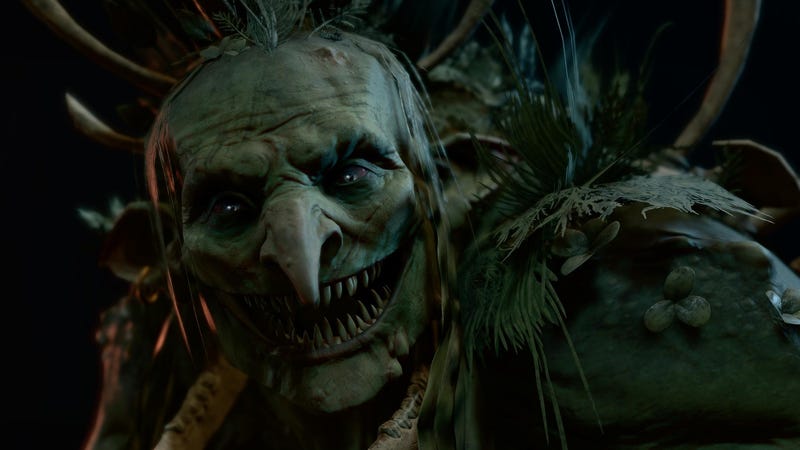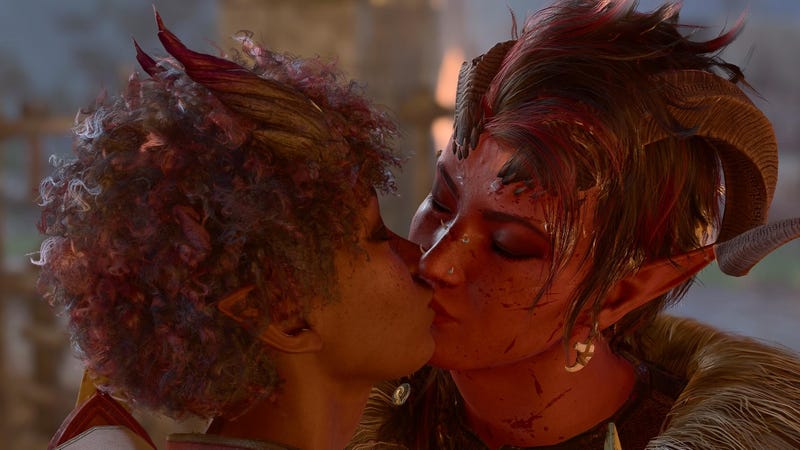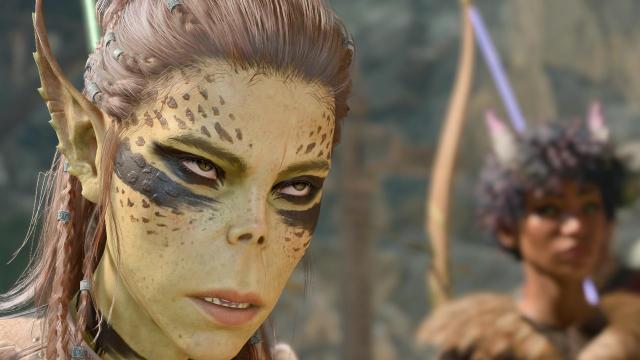The more I play of Baldur’s Gate 3, the more I realize how unsure I am of what I’ve done. This extraordinary, enormous game has me in deep, meticulously exploring its every tiny detail, getting involved in every aspect I can find, and the further I get, the less certain I am about every choice I’ve made. Which, it occurs to me, I’ve never experienced in any RPG of its like before. So why? What is it about Larian’s latest epic that makes it so hard to predict?
Note: I’ve done my absolute best to avoid spoilers here, avoiding specific details of major events, but given I’m discussing my own experiences and reactions, it’ll likely be considered spoilery by some. Be forewarned.

Editor’s note: Gonna bung a spoiler warning graphic in anyway, just in case. I got your back. — David.
I’ve been playing BioWare-style RPGs for as long as there’s been a BioWare and the various spin-off companies to make them. Which is to say, I count those from Obsidian and Black Isle, and now, of course, Larian (not least since BioWare hasn’t made one since 2017, nor one worth playing since 2014). Over that time, it’s fair to say we’ve learned a few repeated patterns—notable ways these games are structured—especially when it comes to their moral paths. We have, to put it simply, learned to cheese the story.
From Baldur’s Gate to Pillars of Eternity, Knights of the Old Republic to Alpha Protocol, these terrific games have given us endless choices to make, the freedom to bend the story to our actions. In doing so, however, these games have also taught us to predict their rhythms and understand their narrative structure, bringing us to the point where major narrative moments in such games have all the weight of a well-worn cinematic cliche, allowing anyone familiar with the genre to make a savegame with the name in ALL CAPS, because they know the Big Decision is coming. Let alone those “moral choices,” glorious though they’ve always been, which tend to split along polar opposite binaries. I considered myself a seasoned adventurer in these lands, able to see meaningful choices and grasp their implications from a mile away.
Then, along comes Baldur’s Gate 3. And…I’m lost! I’m not three steps ahead of it! I can’t second-guess where it’s going! I don’t already know the consequences of the choices I’m making!

It’s absolutely extraordinary how much this has pulled the rug out from under me. While there are of course examples of amazing surprise moments in many of the previous games in the genre, it’s still the case that you tend to have a grasp on where things are heading, and from which side you’re approaching them. Not only are such key events heavily flagged with hefty exposition, but you also have a cast of characters around you to loudly complain or cheer based on what you do. The goody-two-shoes is upset! You’ve been evil. The sneering evil robot is disgusted! You’ve been good. Oh, and did you side with the angels in the white robes with the floaty halos, or those devilish horned creatures from below the ground? Gosh, what could that ever mean?
In Baldur’s Gate 3, which I’m about halfway through (I checked with Kenneth), I genuinely have no idea whether I’m on the side of good or evil. I’ve made so many significant choices, huge decisions that seem so important, and am absolutely unclear if they were “right” or “wrong.” Not because the game is ambiguous, but because morality is ambiguous.
I have sided with groups of people because they seem like, to reflect how simplistically I’ve approached it, “the good guys.” I’ve later wondered if I’ve made terrible mistakes, as the consequences of my decision reverberate around me, people dead if not by my hand, then at least as a result of my spur-of-the-moment instincts. I’ve made big, important choices about the tadpole living inside my head, and the deeper I get into this extraordinary story, the more I doubt myself, wondering if I’ve gotten it all wrong. Heck, I inadvertently killed an owlbear, then watched as its own child ate its corpse, and I’m now wracked with guilt as I think the poor little bugger is the one that’s now living in my camp and has no idea I’m the one who made it an orphan. It trusts me.
Even an asidequest (yes, I just made up that term, and yes, you can use it as if it’s yours) about whether to steal a key from a bird’s nest had me torn up about what to do. It was a little blue jay, and the “quest” was as irrelevant and immaterial as you could imagine. I could just threaten the thing out of the way and grab the key, except, no, I couldn’t. Because that’s horrible! So instead I somehow found myself in a tough but inconsequential battle with a group of enormous eagles, one of which I fear might have been some ancient, noble creature, because the blue jay told me they’d bullied it out of its original nest. It could have been lying! It’s like fractals of incertitude.

The reason this is all possible is, I think, fairly simple: Baldur’s Gate 3 has the confidence to let you simply not know. That’s a scary thing for a game to do, a risk that it could lose its players, lacking the required motivation and connection to their character to invest 80 hours into finding out what’s really going on. You can see why a game made under the gaze of panicking publishers—or even just unconfident developers—might be required to ensure the player is certain where things are heading, and how they’re guiding it there. Because heck, yes, having that taken away is genuinely shocking.
I’m loving it. Just before the midpoint I understand I’m at, it happened again. I was with one group of morally ambiguous people, and ambushed by another. And while I feel like I have a good grip on things, and am pretty sure I knew which I wanted to be aligned with, I’m still clawed by this nagging doubt that I’m wrong. That while I might be siding with nice people, I might not be siding with the right people. Just that—just the idea that the kind, less murdery people might not be the pragmatically preferential group—feels like a massive step forward for RPGs.

A lot of people have been calling for a more sophisticated method of measuring an RPG character than the binary good/evil systems that have dominated for the last twenty years, but I’m not one of them. I’ve always adored being so sycophantically lovely in every possible moment that my character portrait starts to glow with heavenly sparkles. And I think this makes me even more the perfect mark for Baldur’s Gate 3‘s approach. I’m so lost! I’m so without guidance as to my behavior! No omnipotent UI in the sky is letting me know the immediate consequences of my actions!
It’s just fascinating to be left adrift like this. Halfway in, I’ve no idea if I’ve doomed everyone to eternal horror, or if I’m the heroic figure I’m desperately trying to be. And it’s this latter part that I think is the best consequence of all these narrative choices. It’s breaking me from that need to be the hero. I’m finding, the more I play, that I’m making decisions not based on wanting everyone else to love me, but because they’re the best thing to do in that moment, in that place, and the consequences are what they will be. I’ve never played like this before, and it’s deeply, alluringly unsettling.
In so many ways, Baldur’s Gate 3 is faithful, even traditional, to the BioWare model. Certainly in the moment-to-moment exchanges, and the endlessly thirsty campsite conversations, it hits all the same beats. So it’s absolutely captivating to try to figure out how and where it’s so effectively leaving me unanchored. I thought I simply wouldn’t cope without the ethical handrails, but it turns out I’m loving it.
Disclaimer: In previous lives, Baldur’s Gate 3‘s lead writer Adam Smith and I worked together at Rock, Paper, Shotgun. This only makes me judge his work more harshly.

Leave a Reply